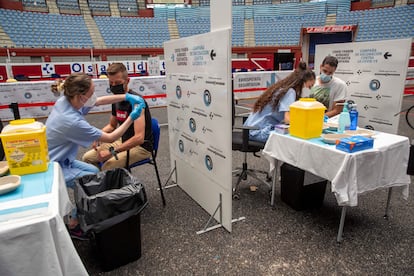Fully vaccinated in Spain will no longer have to quarantine if they come into contact with a positive case
This group will, however, have to take two PCR tests to ensure they have not contracted the virus

The Spanish Health Ministry announced on Tuesday that people who are fully vaccinated against Covid-19 will no longer have to quarantine if they come into contact with a positive case. This decision was reached by Spain’s Public Health Commission, which brings together the Health Ministry and representatives from the region.
“People who are fully vaccinated and considered a close contact [of a positive case] will generally be exempt from the quarantine rule,” the Health Ministry explained in a press release.
A close contact is defined by the Health Ministry as anyone who has been in the same place as a positive case, at a distance of fewer than two meters, for a cumulative sum of more than 15 minutes in 24 hours. Under the previous rules, anyone who met this definition needed to self-isolate for 10 days – regardless of whether they had been immunized.

People who have full protection against Covid-19 will, however, be required to take two PCR tests – one at the beginning and another seven days after the last contact with the coronavirus case.
People who are fully vaccinated have a very low risk of developing a serious case of Covid-19, but they can still spread the virus, even if they show no symptoms. Studies in the United Kingdom, however, suggest that they have a lower capacity to transmit the coronavirus than people who have not been immunized.
The Health Ministry recommended on Tuesday that those with full protection who have come into contact with a positive case not attend crowded events, wear a face mask during social interactions and avoid “vulnerable and unvaccinated people.”
A person is considered to have full protection against Covid-19 if they have received two shots of the Pfizer-BioNTech, Moderna or Oxford-AstraZeneca vaccine, or a single dose of the one-shot Janssen vaccine. People who have recently recovered from the virus and then received one dose of the Pfizer, Moderna or AstraZeneca vaccine are also considered to have full protection.
A total of 14,745,736 people in Spain have been fully vaccinated against Covid-19, according to the latest data from the Spanish Health Ministry. The government aimed to have 15 million people with full protection by June 20, but fell short of this target by more than 500,000. The situation was blamed on delivery setbacks with Janssen and AstraZeneca, even though Spain has nearly three million doses in storage.
The decision from the Public Health Commission comes as the incidence rate in Spain continues to fall. According to the latest Health Ministry report, released Tuesday evening, the 14-day cumulative number of cases per 100,000 inhabitants now stands at 92.25, a slight fall from Monday’s figure of 92.46. The regions with the lowest incidence rate are Galicia (41.45) and the Balearic Islands (42.68).
There are currently 2,691 Covid-19 patients in hospitals in Spain, and 728 in intensive care units (ICUs), with the occupancy rate at 2.19% and 7.8%, respectively. The report added 30 fatalities to the official toll, which now stands at 80,719. This figure, however, is likely to be much higher given that thousands of people died without being diagnosed during the first wave, meaning they were not included in the official count.
Concern in Catalonia
Experts in Catalonia have expressed concern over the rising number of coronavirus cases in the northeastern region. The reproduction rate, the so-called R number – i.e. how many other people an infected person passes the virus on to – rose to 1.08 on Tuesday. This is the first time the number has passed the one-threshold in nearly three weeks.
“We are seeing a 10% weekly rise in positive cases and it is possible that this rate will increase,” said Enric Álvarez, a member of the research group BioComSC at Catalonia’s Polytechnic University (UPC).
The rise in cases has been blamed on the delta variant of the coronavirus, first detected in India. Last week, the strain accounted for 20% of new contagions, according to data from the Catalan health department, but there are concerns that the figure is now between 30% and 40%. Experts argue that it will become the predominant strain in Spain in a matter of weeks.
The uptick in cases has also been attributed to the easing of coronavirus restrictions and increased social interaction. Measures aimed at containing the pandemic, such as the curfew and ban on inter-regional travel, were lifted after the end of the state of alarm on May 9. And as of Monday, nightclubs and nighttime venues in Catalonia can open until 3.30am.
“The vaccination has not yet achieved group immunity, restrictions have been relaxed and the delta variant continues to be entrenched in our territory,” said Jesús Caballero, the head of the Catalan Society of Intensive Care and Critical Medicine.
In Catalonia, only 35.6% of the population is fully vaccinated, while 56.7% has received at least one dose of a Covid-19 vaccine.
With reporting by Bernat Coll.
English version by Melissa Kitson.
Tu suscripción se está usando en otro dispositivo
¿Quieres añadir otro usuario a tu suscripción?
Si continúas leyendo en este dispositivo, no se podrá leer en el otro.
FlechaTu suscripción se está usando en otro dispositivo y solo puedes acceder a EL PAÍS desde un dispositivo a la vez.
Si quieres compartir tu cuenta, cambia tu suscripción a la modalidad Premium, así podrás añadir otro usuario. Cada uno accederá con su propia cuenta de email, lo que os permitirá personalizar vuestra experiencia en EL PAÍS.
¿Tienes una suscripción de empresa? Accede aquí para contratar más cuentas.
En el caso de no saber quién está usando tu cuenta, te recomendamos cambiar tu contraseña aquí.
Si decides continuar compartiendo tu cuenta, este mensaje se mostrará en tu dispositivo y en el de la otra persona que está usando tu cuenta de forma indefinida, afectando a tu experiencia de lectura. Puedes consultar aquí los términos y condiciones de la suscripción digital.








































